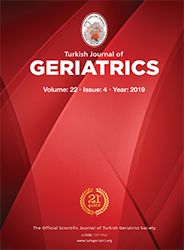Materials and Method: A total of 148 female patients aged ?70 years who were admitted to the University of Health Sciences Istanbul Training and Research Hospital Radiation Oncology clinic between 2011 and 2017 were evaluated.
Results: Age (p<0.001), tumor diameter (p<0.001), operability (p<0.001), tumor stage (p<0.001), lenfovascular invasion (p=0.045), estrogene receptor positivity (p=0.002), progesterone receptor positivity (p=0.046), metastasis (p<0.001), Ki 67 ? 14 ratio (p=0.035), Charlson comorbidity index (p=0.005), and radiotherapy applicability (p=0.023) were significantly associated with overall survival. Multivariate cox regression analysis revealed that age (HR=1.126, 95% CI=1.048?1.210, p<0.001), estrogene receptor positivity (HR=3.701, 95% CI=1.286?0.652, p=0.015), and presence of metastasis (HR=0.210, 95% CI=0.051-0.863, p=0.030) were independent prognostic factors.
Conclusion: According to our clinical experiences, the treatment approach for healthy elderly women with recently diagnosed breast cancer is similar to that for young women, i.e., surgery, axillary evaluation, radiotherapy, and systemic adjuvant therapy (depending on tumor properties and recurrence risk). In elderly breast cancer patients, ER positivity, absence of distant metastasis, and age younger than < 79 years old have been identified as independent prognostic factors that positively affect survival.
Keywords : Breast cancer; Survival; Prognosis; Aged
